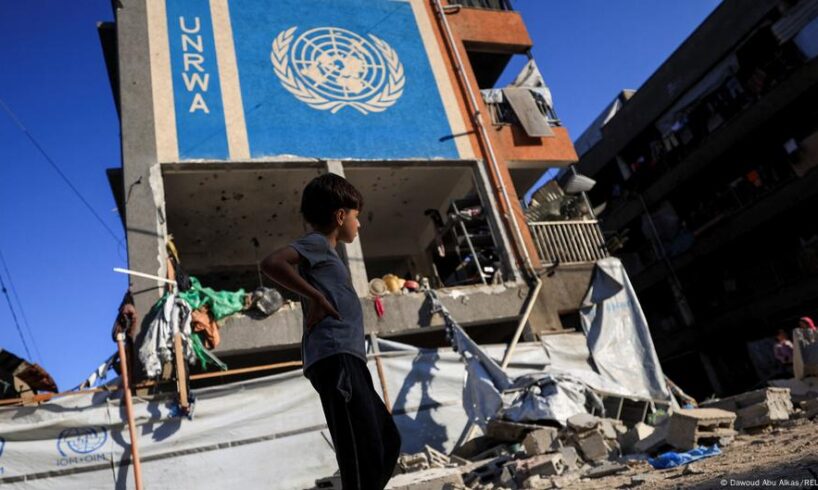
Shafiq* is a Palestinian who ended up in limbo after he managed to get out of Gaza and make his way via Egypt and Turkey to Germany, where he applied for asylum.
The right to asylum is enshrined in Germany’s constitution and is granted to individuals who face persecution in their home country due to their race, religion, nationality, political opinion, or membership in a particular social group.
But 65-year-old Shafiq arrived a few months after Germany’s Federal Office of Migration and Refugees (BAMF) halted the processing of asylum applications in January 2024.
“I didn’t know. I wasn’t sure why they weren’t giving me papers. I sent a letter. Maybe six months ago, they answered that they had to wait to know what the situation was in Gaza,” he said.
Germany reluctant to toughen stance toward Israel on Gaza
To view this video please enable JavaScript, and consider upgrading to a web browser that supports HTML5 video
‘Deprioritized’: Freeze in Palestinians’ asylum applications
Human rights groups, lawyers and some opposition politicians have rejected BAMF’s reasons for freezing applications for people like Shafiq.
BAMF cited Article 24 of the Asylum Law, which allows decisions to be postponed in “a temporary uncertain situation.” At the time of the suspension, at least 24,000 Palestinians had already been killed in the military incursion launched by Israel, according to Gaza health officials.
In a statement issued to DW in conjunction with the German Interior Ministry, BAMF said that decisions about applicants from the Gaza Strip had been “deprioritized” within the administration. The reasons cited by the spokesperson are: “the conflict triggered by the October 7, 2023, attack on Israel by Hamas” (classified by Germany as a terrorist organization) and “the lack of information about the situation in the conflict zone and what persecution the civil population is facing.”
BAMF found guilty of inaction
Legal cases were launched challenging the Federal Office of Migration and Refugees’ inaction — most courts ruled in the thwarted applicants’ favor. By April 2025, courts had ruled in favor of Palestinian plaintiffs some 187 times.
In July 2025, the Federal Interior Ministry (BMI) disclosed in response to media inquiries that asylum claims processing had been resumed, as the situation in Gaza was no longer judged “uncertain.”
Refugee advocacy organization Pro Asyl told DW that the BAMF processing freeze should never have occurred in the first place. “The actual conditions in Gaza prove that people are very much in real danger of becoming a victim of Israel’s military operations at any time simply by their sheer presence,” said the organization’s legal rights spokesperson, Peter von Auer.
Berlin-based human rights lawyer Alexander Gorski described BAMF’s freeze as “absurd,” adding: “It is very politically difficult to say the situation is unclear — and very inhumane.”
The number of open asylum cases from people from across the Palestinian territories lodged with German authorities stood at around 1,100 in February 2024. The ongoing blockade of Gaza has made it practically impossible to leave and Palestinians who have fled often choose to join relatives settled in many other parts of the world. In 2024, a total of 634 asylum applications were lodged by Palestinians in Germany. This sank further to 185 in the first six months of 2025.
Food, critical aid supplies only trickling into Gaza
To view this video please enable JavaScript, and consider upgrading to a web browser that supports HTML5 video
Asylum, refugee status or subsidiary protection
Advocacy group The Refugee Council of Lower Saxony is helping Palestinians from Gaza and the West Bank to fight for refugee status.
Up to now, Palestinians have often been denied the full protection status afforded to other refugees under the Geneva Convention. This has been linked to their exceptional status. Palestinians are the only refugee group to have their own UN agency, UNRWA, which is regarded as responsible for their protection and assistance.
Established in late 1949 to provide education, healthcare, food and other services, UNRWA — which operates in Jordan, Lebanon, Syria, the Gaza Strip and the West Bank, including East Jerusalem — was intended to be a temporary measure to help displaced Palestinians after their expulsion from what is now Israel.
Germany grants “subsidiary protection” status to those who do not qualify for asylum or refugee protection but are at risk of serious harm if they return to their home country, such as the death penalty, torture, or arbitrary violence in an armed conflict.
However, with the UN Palestinian refugee agency currently unable to operate in the Gaza Strip after the Israeli parliament passed a ban, German refugee rights groups and politicians are now questioning whether the granting of subsidiary protection status is legally sound. Article 1d within the Geneva Convention foresees the provision of full protection to Palestinians, too, if UNRWA’s help has ceased for any reason.
Lawyer and Refugee Council spokesperson Caroline Mohrs cited a European Court of Justice ruling from June 2024 in line with that clause.
In Germany, refugee status has clear advantages. It is possible to receive permanent residency after three years — whereas it is five years at the earliest for people with subsidiary protection. And the chance of being allowed to benefit from programs to reunite with their families is higher as well.
The new coalition of the conservative Christian Democrats (CDU), Christian Social Union (CSU) and the center-left Social Democrats (SPD) moved in June 2025 to suspend family reunification for those with subsidiary protection status for at least the next two years.
Left Party parliamentarian Clara Bünger is calling for Gazans to receive refugee status upon arrival in GermanyImage: dts Nachrichtenagentur/IMAGO
Left Party parliamentarian Clara Bünger is also calling for Gazans who flee to Germany to receive refugee status upon arrival. “Many see subsidiary protection as temporary protection. But people need a long-term perspective. And one thing is clear: no one will be able to return to Gaza, to this strip of land,” Bünger, who serves as her party’s interior affairs spokesperson in parliament, told DW. A lawyer herself, she is now calling for the unprocessed asylum applications to be dealt with “quickly and fairly.”
Shafiq is still in the dark about how his asylum case will proceed. A social worker and father of four, he left his homeland in 2022 in search of a better life for himself and his family — and the hope of getting medical treatment for his sick daughter.
After the Palestinian’s departure from Gaza, his 26-year-old daughter died of cancer and his youngest son was killed in an Israeli rocket attack, he told DW. Two other adult children have made it to Europe — one to Germany, but authorities did not permit him to live in the same town as his son. His wife remains in Gaza, living in a tent. The family apartment was destroyed amid the military assault.
The Palestinian does not know whether he will be allowed to stay in Germany, but on one thing he is clear: “There is no future, no safety, nothing in Gaza.”
*DW has verified Shafiq’s identity but is not publishing his full name in order to protect his and his family’s privacy and security.
Edited by Kyra Levine and Rina Goldenberg
While you’re here: Every Tuesday, DW editors round up what is happening in German politics and society. You can sign up here for the weekly email newsletter, Berlin Briefing.





